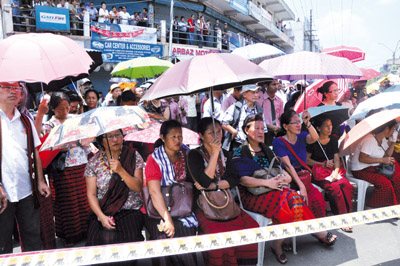Nagaland Tribal Council Rally Turns Out to be Massive, Chief Minister Says 'Meaningless'.
NTC organised a mammoth rally
NEW DELHI: The massive rally organised by the Nagaland Tribes Council (NTC) on Tuesday in the heart of Zunheboto Town was the one of the largest ever gathering in the town.
Over five thousand people from different spheres- be it students, youth, civil society, organisations, attended the mammoth rally on Tuesday.
The rally was organized as a part of an awareness campaign launched by NTC with respect to issue of recognition of the ‘Rongmei’ tribe and the state government’s proposed move to set up Nagaland Special Development Zones (NSDZs).
The demonstration, hosted by Sumi Hoho (SH) also witnessed the adoption of a three-point resolution by the NTC.
Firstly, the resolution reiterated and reaffirmed the NTC resolution adopted during the May 13 Dimapur rally.
Second, NTC also resolved to “oppose the Nagaland Special Development Zones (NSDZs) in the present form and urged the state government to thoroughly review the Assembly resolution.”
Calling the decision of the state government to implement the NSDZs to be “utterly detrimental to the interest of the people of Nagaland”, it added that “ the present form Nagaland Special Development Zones was going to have immense sel-infringement on the existing protective laws.”
Lastly, the resolution further authorized the NTC to pursue the matters till the demands were fulfilled.
Earlier chaired by Theja Therieh, the rally began with an invocation prayer by Zunheboto Town Sumi Baptist Church (ZTSBC) associate pastor.
Theja highlighted the objective of the rally and briefed the gathering on the Rongmei tribe recognition and NSDZ issues.
Then followed the welcome address and the introduction of the NTC visiting team from Kohima, Dimapur, Wokha and Mokuchung towns by Sumi Hoho president Toniho Yepthomi.
NTC President Lendinoktang, while expressing gratitude to the Sumi people, said that Sumis, like their forefathers should spearhead the NTC movement towards the betterment of Nagas in Nagaland. He also pointed out that Nagas had only 14 tribes prior 1963 settlement and further two more tribes-- the Kacharis and Kukis were included taking the total number of tribes 16.
The next speaker Vimedo Hibo, a member of NTC exhorted the gathering and cautioned the younger generation to be vigilant and wise while dealing with adversaries and said that Nagas of Nagaland should be united against these policies of the government.
Z. Lohe, the last orator to address the assembly acknowledged the Sumis as torch bearers of the land.
He also briefed on the CPO-SH brotherhood and concluded by citing the example of Tripura where the indigenous population was outnumbered by migrants from outside the state.
The rally finished with Nagaland Tribes Council General Secretary Nrimbemo Ngullie who read out the resolutions that were adopted.
While the rally turned out to be huge in terms of its attendance, Nagaland Chief Minister T.R. Zeliang described this public rally at Zunheboto town as “meaningless” since the government had already convened a public consultation on the matter of the development of NSDZ’s ( which was the chief issue of the rally) on September 26.
Reiterating this, Zeliang pointed out that NTC knew that the government had already agreed to hold consultations on the matter so it was meaningless to have held the rally.
Also, he said that anyone wanting to air complaints or express views on NSDZ should attend the meeting, adding, that the government would welcome all suggestions.
The Chief Minister further stated that NSDZ was only a “resolution with a vision” and that it was neither an Act nor a Rule.
Responding to a query on recognition of Rongmei as a tribe of Nagaland Zeliang reminded that recognition had already been decided more than a year back but that the matter was still pending in the court.
Against the backdrop of huge outcry over the matter, Zeliang said that though the matter was in court, the government had constituted a committee to examine the issue and that the government would only then “do whatever is necessary” after the committee submits its report.





